70mm Retrospective Berlin 2009
|
Read more
at in70mm.com The 70mm Newsletter |
| Written by: Thomas Hauerslev with contributions from Herbert Born (Schauburg), Albert Knapp, Ralf Dittrich (Retrospective), Connie Betz (Programme Coordinator Retrospective) | Date: 07.02.2009 |
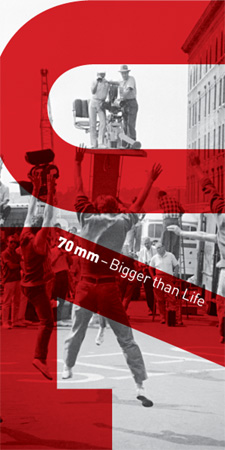 Simple,
yet very effective 70mm Retrospective identity. A scene from "West Side
Story". Black and white with two essential "70" digits on top . Used on
official poster, the Retrospective book and flyers. Simple,
yet very effective 70mm Retrospective identity. A scene from "West Side
Story". Black and white with two essential "70" digits on top . Used on
official poster, the Retrospective book and flyers.The international filmfestival in Berlin Germany, known as the Berlinale Filmfest, is showing a large programme of 70mm films in February 2009. Headlined "70mm - Bigger Than Life", it is the first "major" filmfestival that is putting a spotlight on 70mm films. Accompanied by a book and lectures, the Berliners, and foreign guests, can treat themselves to a variety of 70mm films from the great roadshow era. The preparations to do all this have taken many years and a lot of hard work. Let's go back a little and look at history. Regular 70mm film presentations faded away almost overnight when digital sound was introduced in the early 1990s. Before that, for nearly 40 years, 70mm presentations signified the best possible presentation in cinemas. "In 70mm" was a tagline seen around the world, used in newspaper advertisements and theatre marquees, which promised a significantly superior presentation. 70mm was always something special with LARGE screens and BIG sound. After the premature "death" of 70mm, there has been an increasing awareness and interest in showing the old films again. This is done, on occasion, in regular cinemas still equipped with 70mm projectors and sound, but also in an organized fashion where people meet and see films over an entire weekend at some theatres where such showmanship still survives. From early morning till late in the evening devotees can absorb these amazing images. There are several venues which specializes in this form of festival. Perhaps the most famous is the "Widescreen Weekend" in Bradford in the UK. Since 1994 the "mother of all 70mm festivals" have kept the flag waving for 70mm and large format films and presented them on the big curved screen. |
More
in 70mm reading: Berlin 2009 - Programme of Events Complete Berlinale Retrospective 2009: 70 mm - “Bigger than Life” New 70mm print of "Flying Clipper" Internet link: youtube.com youtube.com Tagesspiegel Taz Süddeutsche Berliner Morgenpost Projectinist at the Kino International der Fritag Maerkische Allgemeine Variety berlinale.de 70mm retro page Bundesarchiv Filmarhciv kinokompendium.de filmvorfuehrer.de Deutsche Kinemathek - Museum für Film und Fernsehen Retrospektive Potsdamer Str. 2 D-10785 Berlin Tel. +49 (30) 818 916 52 Fax +49 (30) 300 903 13 |
|
Perhaps inspired by the pioneering
work done by
Bill
Lawrence in Bradford, more cinemas
and museums have premiered their own "70mm Festivals". Since 2000
Oslo have done a great
work for 70mm. Headed by Jan Olsen, they have had 70mm festivals almost
annually with two daily screenings over 10 days. Herbert Born in
Karlsruhe introduced the classy
"Todd-AO Festival" in 2005. Every year in the first
weekend in October many guests from Germany and abroad arrive at the
Schauburg Cinerama cinema for a weekend of large format movies. The
Dutch film museum has also presented a number of 70mm festivals at more
irregular times. Mr. Jakub Klima and "Kino Mir 70"
cinema owner Mr. Pavel Tomešek in the Czech Republic also began their
"70mm Seminar" series in 2006. And of course the Americans have also had
their 70mm festivals in several states. Among them, The American
Cinematheque at the
Egyptian
Theatre is one of the most prominent, being in the very heart of
Hollywood and the home of chief projectionist
Paul
Rayton. The Paramount
Theatre in Austin, Texas is also a frequent 70mm player.
Thanks to a large number of 70mm fans, regular presentations are now
listed regularly at in70mm.com's
"now showing in 70mm" page. |
|
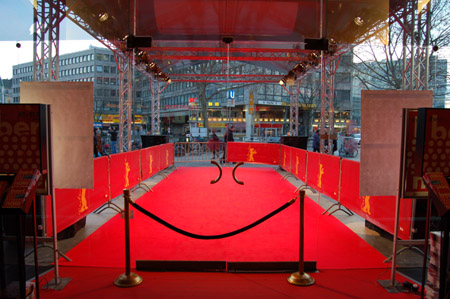 The interest in seeing the old, (and sometimes
faded) 70mm films, have gained momentum. The numbers of people in the
audience is rising year after year, and there are more and more 70mm
festivals being organized. The average 70mm fan is a connoisseur who is
extremely dedicated and has seen 70mm films in the 1960s and wants to see it
again, presented on the huge curved screen. Very often he (and it is mainly
a male audience) is seen in conversations with other connoisseurs discussing
details about presentations and cinemas. It is a brotherhood where people
know each other and meet regularly for these events. It is not unusual also
for a devoted fan of 70mm to fly around the globe to attend screenings in
70mm and/or Cinerama. They are a very dedicated audience. Once they feel the
"70mm testosterone" working inside, they simply have to go to the next 70mm
festival. The interest in seeing the old, (and sometimes
faded) 70mm films, have gained momentum. The numbers of people in the
audience is rising year after year, and there are more and more 70mm
festivals being organized. The average 70mm fan is a connoisseur who is
extremely dedicated and has seen 70mm films in the 1960s and wants to see it
again, presented on the huge curved screen. Very often he (and it is mainly
a male audience) is seen in conversations with other connoisseurs discussing
details about presentations and cinemas. It is a brotherhood where people
know each other and meet regularly for these events. It is not unusual also
for a devoted fan of 70mm to fly around the globe to attend screenings in
70mm and/or Cinerama. They are a very dedicated audience. Once they feel the
"70mm testosterone" working inside, they simply have to go to the next 70mm
festival.This, the most ambitious 70mm festival to date, was announced in the fall of 2008 by the Deutsche Kinemathek in Berlin, Germany. It's absolutely the largest celebration of the majestic 70mm format in many years. This article will give some background information about the festival. I have asked the organizer to comment on a few things about planning the festival and I hope to include some reviews from festival guests too. Thomas Hauerslev, Editor, in70mm.com |
|
About the Retrospective |
|
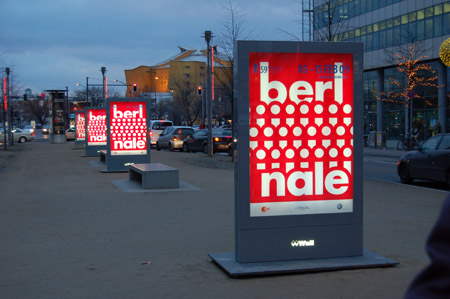 Question: Can you give me some historical background information
about your 70mm Retrospective, please? How many years have you planned it Question: Can you give me some historical background information
about your 70mm Retrospective, please? How many years have you planned itAnswer: Our first plans to organize a 70mm retrospective in the framework of Berlinale began in 1995/96. At that time, a lot of research work had been done, but then, for various reasons, plans had been suspended, and it took more than ten years until that project became feasible indeed. You know better than anyone else how much it takes to get an extensive 70mm programme together. One of the things which definitely helped has been the activities of some studios in the field of 70mm, so that more than few titles are available today in restored versions. Question: Tell me a bit about the Retrospective book? Answer: The paperback edition is available for (19,90 EUR) the hardcover costs slightly more (22,90 EUR) and can be purchased at (or ordered through) any regular book shop. Question: I'm very excited to learn that a new 70mm print of German MCS-70 film "Flying Clipper" is being shown. Tell me more about that, please? Answer: Though our retrospective has been the trigger to strike a new 70mm print of "Flying Clipper", the credit is to be given to the Bundesarchiv-Filmarchiv (Barbara Heinrich-Polte). |
|
Cinemas |
|
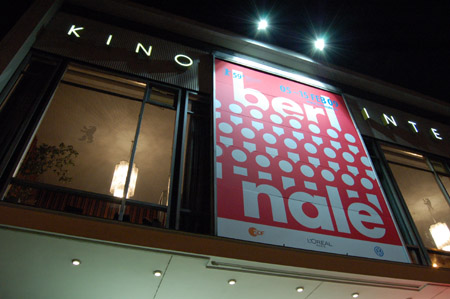 Question: Tell me about the historical
background of the 70mm cinemas you are using and why you have selected only
evening screenings Question: Tell me about the historical
background of the 70mm cinemas you are using and why you have selected only
evening screeningsAnswer: Kino International in 1963 opened as the third cinema for 70mm presentations in (the former) "East" Germany. As for Cinestar, it is one of the new cinemas at Potsdamer Platz, which opened like ten years ago. So there is not much history, but for some reason one of the halls had been equipped for 70mm. |
|
|
You sure know that not many cinemas are left in Berlin which are furnished
for 70mm, and all of them are used for festival presentations, while the
halls we are using usually for our retrospective screenings (CinemaxX 8 and
Zeughauskino) are not. Considering the rather complex logistics of a
festival as huge as Berlinale, it needed thorough thinking to swap cinemas.
We are quite happy with the solution found in the end: i.e. screening in one
cinema which has been conceived more than 40 years ago as a typical 70mm
theatre, but having screenings also at Potsdamer Platz which became the
heart of the festival. (Of course, having screenings at Delphi would have
been nice - but one simply can't have it all.) |
|
People behind the Retrospective |
|
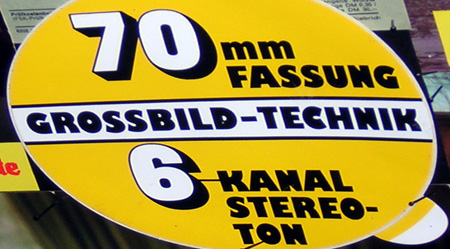 Cool
70mm German sticker for superior larger-than-life presentations. Image
by Thomas Hauerslev Cool
70mm German sticker for superior larger-than-life presentations. Image
by Thomas HauerslevQuestion: Connie [Betz], you are the person with over all responsibility for the Retrospective. Tell me a little bit about your job and which 70mm films you would like to see. Answer: My official job title is "programme coordinator", but as in many cases, in real life things are a bit more complex. The retrospective team, except for myself, consists of: Rainer Rother who is not only artistic director of Deutsche Kinemathek, but also head of the retrospective section, Gabi Jatho who is in charge of all our publications, and Ralf Dittrich who is working as freelancer for the retrospective. As for my favorite films: let’s talk about films I would recommend: except for the shorts, naturally those which are rather difficult to obtain, i.e. the Soviet films. Certainly one of our most rare, and most beautiful titles is "Stars of the Day". |
|
70mm Cinemas in Berlin |
|
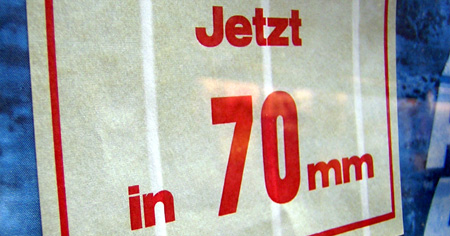 Another
vintage 70mm German sticker for superior larger-than-life presentations.
Image by Thomas Hauerslev Another
vintage 70mm German sticker for superior larger-than-life presentations.
Image by Thomas HauerslevBerlin has a very rich 70mm cinema history, but in recent years, like many other German cities, no cinemas have regular 70mm screenings anymore, except at the Imax cinema. Even one of the two IMAX cinemas has closed and is now used as a theatre. Mr. Albert Knapp has supplied this short list of Berlin's 70mm history. Berlin cinemas with 70mm equipment still in use: Arsenal, Saal 1, Potsdamer Platz 2 Delphi, Kantstr. 12a Filmpalast/now: Astor Film Lounge, Kurfürstendamm 225 Kino International, Karl-Marx-Allee 33 Odeon, Hauptstraße 116 (Schöneberg) Urania-Filmbühne, An der Urania 17 Zoo Palast/UCI Kinowelt Zoo Palast 1 Berlinale Palast/Stella Musical Theater, Marlene Dietrich Platz (only temporary use) Cinestar IMAX Theater, Potsdamer Str. 4 (IMAX!) Cinestar 8, Potsdamer Potsdamer Str. 4 |
kinokompendium.de |
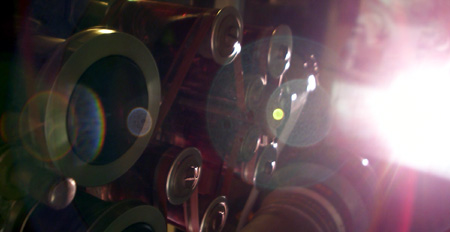 Demolished cinemas: Demolished cinemas: Royal Palast and City/later Royal 1+2, Tauentzienstraße (Europa-Center), now Saturn Hansa store MGM-Theater, Kurfürstendamm Capitol (once build as Universum by Erich Mendelsohn 1927/1928), completely new built but looking like the old front, once screened Cinerama and 70mm. Former cinemas: Kosmos/Kosmos UFA Palast, Karl-Marx-Allee 131 Discovery Channel IMAX-Theater Berlin, now theatre Temporary screenings were at: Waldbühne, Glockenturmstraße (close to olympia-stadion) open air until 2003, had also 70mm screenings Sportpalast (stadium), completely demolished, screened Cinerama, Cinemiracle and 70mm |
|
|
Go: back
- top - back issues
- news index Updated 22-01-25 |
|
